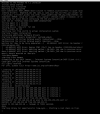i made a fresh install on raid1(2*200 ssds)
and after install stage i have the following hang screen:
tried to upgdate-grub and received the output :
There is no sdb (only two drives are physically connected and they are raided by hardware raid1)
and after install stage i have the following hang screen:
Code:
Loading Linux 5.4.34-1-pve ...
Loading initial ramdisk ...tried to upgdate-grub and received the output :
Code:
Generating grub configuration file ...
/dev/sdb: open failed: No medium found
/dev/sdb: open failed: No medium found
/dev/sdb: open failed: No medium found
/dev/sdb: open failed: No medium found
/dev/sdb: open failed: No medium found
/dev/sdb: open failed: No medium found
/dev/sdb: open failed: No medium found
/dev/sdb: open failed: No medium found
/dev/sdb: open failed: No medium found
/dev/sdb: open failed: No medium found
Found linux image: /boot/vmlinuz-5.4.34-1-pve
Found initrd image: /boot/initrd.img-5.4.34-1-pve
/dev/sdb: open failed: No medium found
/dev/sdb: open failed: No medium found
/dev/sdb: open failed: No medium found
/dev/sdb: open failed: No medium found
/dev/sdb: open failed: No medium found
/dev/sdb: open failed: No medium found
/dev/sdb: open failed: No medium found
/dev/sdb: open failed: No medium found
/dev/sdb: open failed: No medium found
/dev/sdb: open failed: No medium found
/dev/sdb: open failed: No medium found
/dev/sdb: open failed: No medium found
/dev/sdb: open failed: No medium found
/dev/sdb: open failed: No medium found
/dev/sdb: open failed: No medium found
/dev/sdb: open failed: No medium found
/dev/sdb: open failed: No medium found
/dev/sdb: open failed: No medium found
Found memtest86+ image: /boot/memtest86+.bin
Found memtest86+ multiboot image: /boot/memtest86+_multiboot.bin
doneThere is no sdb (only two drives are physically connected and they are raided by hardware raid1)
Last edited:


